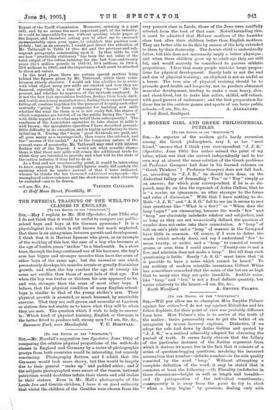PUZZLES.
[To TRY EDITOR OF TUE "SPECTATOR."]
Sin,—As reporter of the modern girl's hardy excursion among the Greek philosophers, may I, as her " next friend," answer that I think your correspondent "J. J. R." (Spectator, June 10th) has rather missed the point of my letter, which was that she arrived independently and in her own way at almost the same solution of the Greek problems as Professor Gomperz had done in his learned volumes on " Greek Thinkers " ? Professor Gomperz does not fall back, as, according to " J. J. R.," he should have done, on the dialectical fallacy of demanding " Yea" or " Nay" simply us an answer ; for which your correspondent, if he is so dis- posed, may fix on him the reproach of Aulus Gellius, that he is " a novice, an ignoramus, an utter stranger to the forms and rules of discussion." With that I have nothing to do. Both "J. J. R." and " A. S. G." fail to see (as it seems to me) that questions like " What is a few ? " or " When does the heap begin ? " are unmeaning, because the words " few " and " heap" are absolutely indefinite relative and subjective, and as long as they are not numerically defined the question of number does not enter into their connotation. A " heap' of salt on one's plate and a "heap" of manure in the farmyard have little in common. Of course, if I were to define the words (which nobody does), and say I understand " few " to mean twenty, or under, and a " heap " to consist of twenty grains, or over, then I could answer : " Twenty-one is not a few, and nineteen does not make a heap." But till then such questioning is futile. Surely "A. S. G." must know that "it is possible to have a noise which cannot be heard." To say nothing of modern scientific inventions, Gilbert White has somewhere remarked that the notes of the bat are so high that to many ears they are quite inaudible. Audible noise, like "heap" and "few," is not a fixed definite quantity, but varies relatively to the hearer.—I am, Sir, &c.,
A. SMYTIIE PALMER.
South Woodford.


















































 Previous page
Previous page